|
Be prepared THE BOY SCOUTS (part 2) |
|
|
|
| Personal
Memory: Once a year there was an action where the Boy Scouts did all kinds of chores for their neighbours to earn some money. This action was called ' Een heitje voor een karweitje' (Bob a Job). A 'heitje' was twenty-five cents, not much. Sometimes you had to brush shoes, a do dishes or shopping at the grocery store, but there were also people that let you clean up their entire garden for hours shamelessly. I remember Saint George’s Day. Once time a year all the scouting groups of the neighbourhood came together in the Burcht (citadel) in Leiden at the crack of dawn. This Burcht was actually only a circular castle wall on a hill in the middle of the town. There we stood lined up, ran up the flag and every year again we listened to the story of Saint George Who Defeated the Dragon, the dragon that represented all the evil of the world. They expected us to do the same thing, though we had to go for evil in another way because of the acute shortage of dragons in those days. We were presented with a red tulip too, that we had to carry all day long, pinned down on our shirt. So we went to school in our uniform and with that tulip that day. I still remember that I hardly dared to move for fear of breaking the stem or making it lose its leaves. 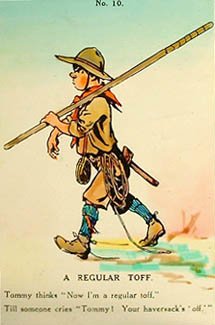 The scouting uniform could be decorated with insignia. Of course one did not acquire them for no reason, one had to earn them. During a Summer Camp I worked for my Woodcutter Badge. I missed the wood and hit my left foot in such a bad way that the scar is still visible nowadays. 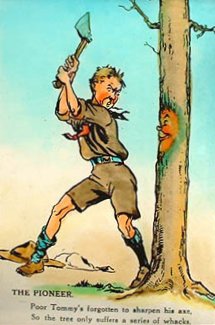 I also gained the Collector Badge. I was cheating however. I went to the scoutmaster’s house with my father’s postage stamp collection. My father accompanied me, probably partly because he did not want the scoutmaster to steal any of his stamps, partly because he did not completely trust it, his son visiting such an old man in short-long trousers. So I won my badge undeserved, for the collection that I flaunted was not mine. Well, after many years I made good when I really started a nice collection. Stamps failed to hold my attention. That's why I'm now collecting…… magic lanterns. |
18. A Cautious
Advance. If you are stalking an enemy (I hope you'll never
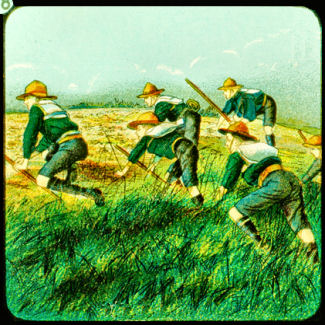 have to do anything of the kind) or a wild
animal, or advancing towards an opposing patrol, and do not want to be seen, this is the way to do it:
"Advance cautiously." Remember the example of the Zulu Scout. If he is
making use of a hill-top or rising ground as a look-out place, he will crawl
up on all fours, lying flat in the grass; on reaching the summit he will
very slowly raise his head till he can see the view. If he sees the enemy
beyond, he will have a good look at them, and, if he thinks they are
watching him, will keep his head perfectly steady for a long time, hoping
that he will be mistaken for a stump or a stone. Any quick or sudden
movement of the head on the sky-line would be very liable to attract
attention, even at a considerable distance.
have to do anything of the kind) or a wild
animal, or advancing towards an opposing patrol, and do not want to be seen, this is the way to do it:
"Advance cautiously." Remember the example of the Zulu Scout. If he is
making use of a hill-top or rising ground as a look-out place, he will crawl
up on all fours, lying flat in the grass; on reaching the summit he will
very slowly raise his head till he can see the view. If he sees the enemy
beyond, he will have a good look at them, and, if he thinks they are
watching him, will keep his head perfectly steady for a long time, hoping
that he will be mistaken for a stump or a stone. Any quick or sudden
movement of the head on the sky-line would be very liable to attract
attention, even at a considerable distance. |
19. A Prisoner brought into Camp. A
favourite exercise among the Scouts is connected with the sending of
despatches and the endeavour to capture the despatch-runner.
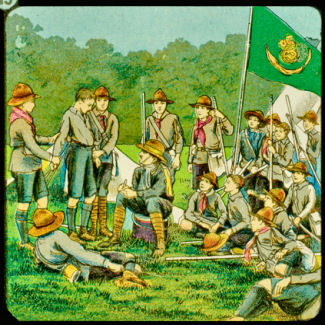 Our friend in the picture has been caught and brought into camp, and he has
quite forgotten that point of Scout law to smile "under all circumstances. "
The chap on the right is doing it to perfection. The despatch-runner was
sent out to take a note to a well-known spot-the post-office in the
neighbouring town. He was to get the note stamped with the post-mark of the
office and return. The rest of the Scouts were posted by their leader to
prevent him getting there by watching all the roads and likely paths by
which he could come, but none were nearer to the post-office' than 200
yards. The despatch-runner was allowed to use any disguise he thought fit,
or to slip through in a cart or waggon if he could get a friendly driver to
give him a lift. But the poor chap couldn't manage the job : he has been
captured. Let's hope they won't shoot him!
Our friend in the picture has been caught and brought into camp, and he has
quite forgotten that point of Scout law to smile "under all circumstances. "
The chap on the right is doing it to perfection. The despatch-runner was
sent out to take a note to a well-known spot-the post-office in the
neighbouring town. He was to get the note stamped with the post-mark of the
office and return. The rest of the Scouts were posted by their leader to
prevent him getting there by watching all the roads and likely paths by
which he could come, but none were nearer to the post-office' than 200
yards. The despatch-runner was allowed to use any disguise he thought fit,
or to slip through in a cart or waggon if he could get a friendly driver to
give him a lift. But the poor chap couldn't manage the job : he has been
captured. Let's hope they won't shoot him! |
|
20. A Bivouac.
Here is a jolly little scene of Scout life-a bivouac in the woods; indeed,
our friends look so comfortable, and have got such a capital but to shelter
in, that we think they can't do better
than turn their bivouac into a permanent camp. They'll have a splendid
opportunity for studying one branch of the Scout's training,
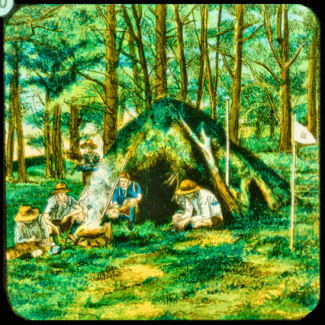 "woodcraft," - the knowledge of nature and of animals. The Scout should be a
lover of animals, it's one of the articles of Scout Law: "A Scout is a
friend of animals. He should save them as far as possible from pain, and
should not kill any animal unnecessarily, even if it is only a fly, for it
is one of God's creatures." Gen. Baden-Powell is a true Scout in this
respect; he believes in keeping pets, and tells how he himself caught and
kept a young wild boar and a young panther, and found them "most amusing and
interesting little beggars. "The boar used to live in the General's garden,
and never became really tame, though caught as a baby. He would come to his
master when called - but very warily; but a stranger or a native he would
"go for" and cut him with his little tusks. He used to practise the use of
his tusks on an old tree stump in the garden, and he would gallop at this
and round it in a figure of eight continuously for five minutes at a time,
and then fling himself down on his side, panting with his exertions. The
panther was a beautiful and delightfully playful beast, and used to go about
with the General like a dog; but he was very uncertain in his dealings with
strangers.
"woodcraft," - the knowledge of nature and of animals. The Scout should be a
lover of animals, it's one of the articles of Scout Law: "A Scout is a
friend of animals. He should save them as far as possible from pain, and
should not kill any animal unnecessarily, even if it is only a fly, for it
is one of God's creatures." Gen. Baden-Powell is a true Scout in this
respect; he believes in keeping pets, and tells how he himself caught and
kept a young wild boar and a young panther, and found them "most amusing and
interesting little beggars. "The boar used to live in the General's garden,
and never became really tame, though caught as a baby. He would come to his
master when called - but very warily; but a stranger or a native he would
"go for" and cut him with his little tusks. He used to practise the use of
his tusks on an old tree stump in the garden, and he would gallop at this
and round it in a figure of eight continuously for five minutes at a time,
and then fling himself down on his side, panting with his exertions. The
panther was a beautiful and delightfully playful beast, and used to go about
with the General like a dog; but he was very uncertain in his dealings with
strangers.
|
|
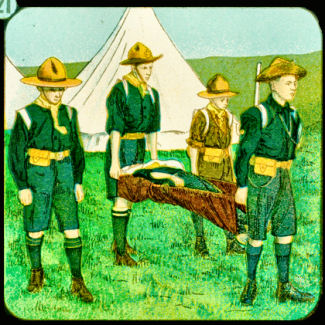 21.
An Injured Comrade. One of the great objects of the Boy Scout movement
is to revive something of that fine spirit of chivalry which we associate
with the knights of old, and which is only too often lacking in the selfish
scramble of our modern life. And so it is one of the most important articles
of Scout Law, that "it is a Scout's duty to be useful and to help others.
And he is to do his duty before anything else, even though he gives up his
own pleasure, or comfort, or safety to do it. When in difficulty to know
which of two things to do, he must ask himself, 'Which is my duty?' that
is, 'Which is best for other people?' - and do that one. He must be prepared
at any time to save life, or to help injured persons. And he must do a good
turn to somebody every day." Accidents will happen sometimes among the
Scouts themselves, and it's a good thing to be able to help an injured
comrade; but the Scout is expected to do a great deal more than this, and is
taught systematically how to render aid in accidents from fire, or panics,
or run-a-way horses, to save life from drowning, and so on. 21.
An Injured Comrade. One of the great objects of the Boy Scout movement
is to revive something of that fine spirit of chivalry which we associate
with the knights of old, and which is only too often lacking in the selfish
scramble of our modern life. And so it is one of the most important articles
of Scout Law, that "it is a Scout's duty to be useful and to help others.
And he is to do his duty before anything else, even though he gives up his
own pleasure, or comfort, or safety to do it. When in difficulty to know
which of two things to do, he must ask himself, 'Which is my duty?' that
is, 'Which is best for other people?' - and do that one. He must be prepared
at any time to save life, or to help injured persons. And he must do a good
turn to somebody every day." Accidents will happen sometimes among the
Scouts themselves, and it's a good thing to be able to help an injured
comrade; but the Scout is expected to do a great deal more than this, and is
taught systematically how to render aid in accidents from fire, or panics,
or run-a-way horses, to save life from drowning, and so on. |
|
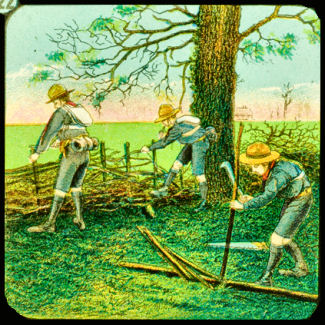 22. "Good Turns":
The Farmer's Hedge - But serious accidents do not happen
every clay, thank heaven, and the obligation to do "a good turn" every clay
is one of the obligations of the Scout law of chivalry. The Scout is to tie
a knot in his necktie to remind him of this duty, and the knot forms a
portion of the badge worn by every Scout. It need not be a great thing that
he is to do. For instance, one thing that he can do is to mend the farmer's
hedge. He is constantly indebted to the farmer for his kindness in letting
him have the run of his fields or woodlands. Let him return the kindness in
this way.
22. "Good Turns":
The Farmer's Hedge - But serious accidents do not happen
every clay, thank heaven, and the obligation to do "a good turn" every clay
is one of the obligations of the Scout law of chivalry. The Scout is to tie
a knot in his necktie to remind him of this duty, and the knot forms a
portion of the badge worn by every Scout. It need not be a great thing that
he is to do. For instance, one thing that he can do is to mend the farmer's
hedge. He is constantly indebted to the farmer for his kindness in letting
him have the run of his fields or woodlands. Let him return the kindness in
this way. |
|
23.
Firewood for the Cottager. -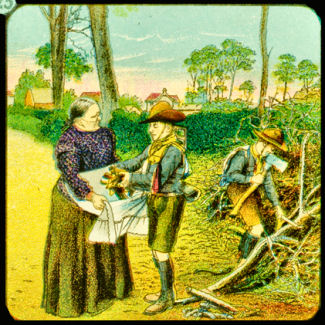 -Again, "the Scout is
to be courteous, that is, to be polite to all, but especially to women and
children, and old people and invalids, cripples, &c. And he must not take
any reward for being helpful or courteous." So our young Scouts find another
opening for doing a good turn to the old lady who lives in the cottage
yonder by helping her to get an apronful of firewood to boil her kettle.
General Baden-Powell, you'll note, does not believe in the system of "tipping." Here
is one of his little stories: "The other day I saw a boy
help a lady out of a carriage, and as he shut the door after her she turned
to give him some money, but he touched his cap, and smilingly said, "No,
thank you, marm; it's my duty," and walked off. So I shook hands with him, for I felt that
though he had not been taught, he was a Scout by nature." -Again, "the Scout is
to be courteous, that is, to be polite to all, but especially to women and
children, and old people and invalids, cripples, &c. And he must not take
any reward for being helpful or courteous." So our young Scouts find another
opening for doing a good turn to the old lady who lives in the cottage
yonder by helping her to get an apronful of firewood to boil her kettle.
General Baden-Powell, you'll note, does not believe in the system of "tipping." Here
is one of his little stories: "The other day I saw a boy
help a lady out of a carriage, and as he shut the door after her she turned
to give him some money, but he touched his cap, and smilingly said, "No,
thank you, marm; it's my duty," and walked off. So I shook hands with him, for I felt that
though he had not been taught, he was a Scout by nature." |
|
| Slides on this page: The Boy Scouts: Junior Lecturer series 782/784 Boy Scouts (3 parts: In Camp with Baden Powell - Campaigning - Scout Law and Chivalry). Original readings. The Junior Lecturers Series was produced by W. Butcher & Sons, London (1870-1906) and the slides were sold as three sets of eight, each in a cardboard box, for about 3/6 per set. Sizes 3,25" square. Cartoons: Some slides of a set of magic lantern slides, all with a humorous Scouting theme. The pictures tell the story of little Tommy when he joined the Scouts and went off to camp, all in full colour. 3,25" square. St. George: Three slides from a set of 12 magic lantern slides 'St. George and the Dragon'. 3,25" square. |
24. An
Up-Hill Job: Lending a Hand - Here's another
chance for you. This old man has got an up-hill job. The harrow is heavy.
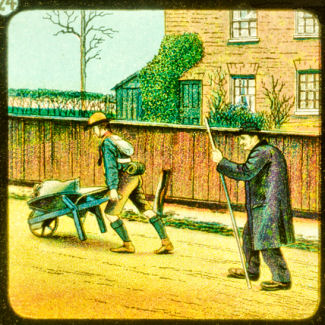 Wheel it up the hill for him, and lend him your pole meanwhile to help him along.
These are some of the little things the Scout may do by way of a good turn;
there are plenty of others, if you'll only look out for them. "If it is
only to put a halfpenny into a poor box, or to help an old woman to cross
the street, or to make room on a seat for someone, or to give water to a
thirsty horse, or to remove a bit of banana skin off the pavement where it
is likely to throw people down, it is a good turn. But one must be done
every day, and it only counts as a good turn when you do not accept any
reward in return." And so, in conclusion, I think we may all very heartily
wish success to General Baden-Powell and his Boy Scouts, for really we
cannot do better than adopt their motto to "Be prepared" always to answer
the call of duty, and their rule of conduct : one good turn every day.
Wheel it up the hill for him, and lend him your pole meanwhile to help him along.
These are some of the little things the Scout may do by way of a good turn;
there are plenty of others, if you'll only look out for them. "If it is
only to put a halfpenny into a poor box, or to help an old woman to cross
the street, or to make room on a seat for someone, or to give water to a
thirsty horse, or to remove a bit of banana skin off the pavement where it
is likely to throw people down, it is a good turn. But one must be done
every day, and it only counts as a good turn when you do not accept any
reward in return." And so, in conclusion, I think we may all very heartily
wish success to General Baden-Powell and his Boy Scouts, for really we
cannot do better than adopt their motto to "Be prepared" always to answer
the call of duty, and their rule of conduct : one good turn every day. |
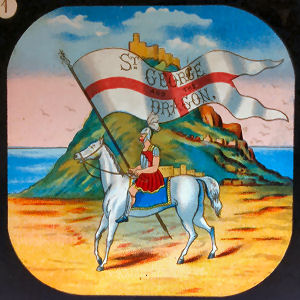 |
Though nothing of Saint
George's life or deeds can be established, legends about him became
popular and increasingly extravagant. The Boy Scout movement uses the story
of his rescuing a Libyan king's daughter from a dragon and then slaying the
monster in return for a promise by the king's subjects to be baptized. It is
a theme much represented in art, the saint frequently being depicted as a
youth wearing knight's armour with a scarlet cross. Saint George became an ideal of martial valour and selflessness. He is the patron saint of England. Feast day April 23. Click here to see the complete set of twelve magic lantern slides. |
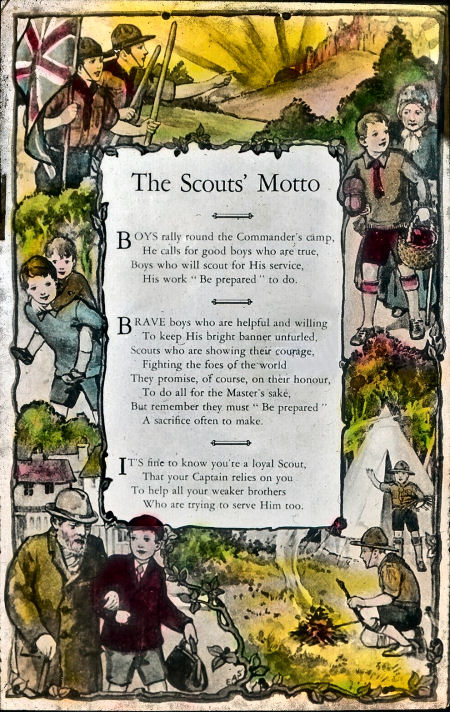 |
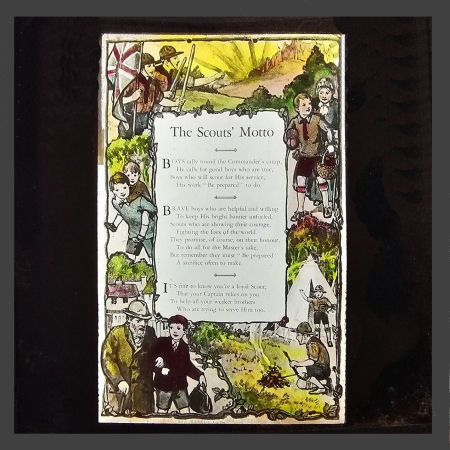 Square magic lantern slide 8.2 x 8.2 cm with The Scouts' Motto. Illustrations around the text mainly emphasize the 'helpful' characteristic. Help for the elderly and young people. The manufacturer of this slide is unknown. |
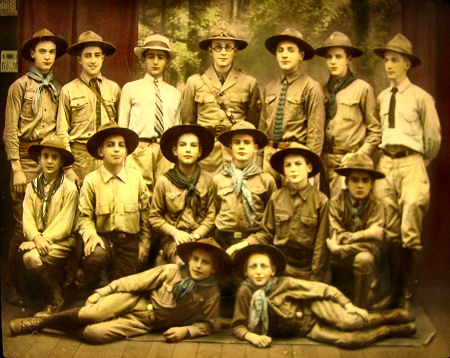 |
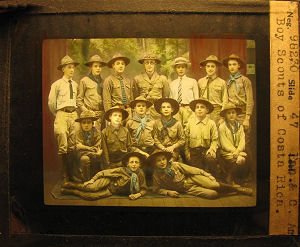  Boy Scouts of Costa Rica.
|
|
St George and the Dragon |
|
| |
©1997-2024 'de Luikerwaal' All rights reserved. Last update: 31-12-2024. |
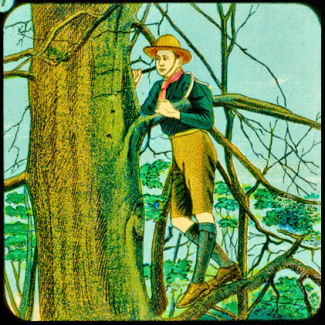 Chapter III. - SCOUT LAW AND CHIVALRY.
Chapter III. - SCOUT LAW AND CHIVALRY.